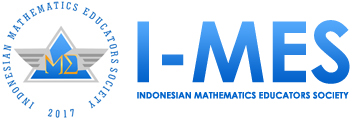Mathematical Literacy Ability of Junior High School Students in Terms of Self-Efficacy
DOI:
https://doi.org/10.35706/sjme.v6i2.6547Abstract
Mathematical literacy is an individual’s ability to formulate, employ, and interpret mathematics in various contexts. One of the factors that influence this ability is self-efficacy. This study aims to obtain an overview of the mathematical literacy ability of junior high school students in terms of self-efficacy. The research method used is qualitative research with a phenomenological approach. The instruments used were researchers as the research implementer, a self-efficacy scale, a mathematical literacy ability test, and interview guidelines. The subjects of this study were three students who had filled out the self-efficacy scale, consisting of one student with a high level of self-efficacy, one student with a moderate level of self-efficacy, and one student with a low level of self-efficacy. The results show that student with a high level of self-efficacy can meet three indicators of mathematical literacy ability and use the knowledge gained from their experience in solving problems, student with a moderate level of self-efficacy can meet two indicators of mathematical literacy ability and tend to try to solve the given problem, meanwhile student with a low level of self-efficacy only meet one indicator of mathematical literacy ability and less aware of the role of mathematics in everyday life.
Downloads
References
Ahmad, M., & Nasution, D. P. (2019). Peningkatan Kemampuan Literasi Matematika Siswa Sekolah Menengah Pertama melalui Pendekatan Kontekstual. Jurnal Education and Development, 7(2), 103–112.
http://journal.ipts.ac.id/index.php/ED/article/view/883/395
Amelina, D. (2020). Analisis Kemampuan Siswa dalam Menyelesaikan Soal Matematika Model PISA pada Konten Perubahan dan Hubungan Ditinjau dari Self Efficacy.
Askar, Rizal, M., & Hamid, A. (2016). Profil Pemecahan Masalah Matematika Siswa SMP Kelas VII pada Materi Bangun Datar Ditinjau dari Tingkat Efikasi Diri. Jurnal Elektronik Pendidikan Matematika Tadulako, 4(2), 314–325.
Bandura, A. (1997). Theoretical Perspectives: The Nature of Human Agency. In Self-efficacy: The exercise of control. W. H. Freeman and Company. http://search.ebscohost.com/login.aspx?direct=true&db=a9h&AN=9703260522&site=ehost-live
Ghofur, A. (2020). Analisis Kemampuan Literasi Matematika pada Experiential Learning dengan Assesmen Unjuk Kerja berdasarkan Self Efficacy.
Ginanjar, A. Y., & Widayanti, W. (2018). Penerapan Model Pembelajaran Multiliterasi untuk Meningkatkan Kemampuan Literasi Matematis Siswa di Sd/Mi. Primary : Jurnal Keilmuan Dan Kependidikan Dasar, 10(2), 117. https://doi.org/10.32678/primary.v10i02.1283
Istiqomah, N. (2019). Kemampuan Literasi Matematika Ditinjau dari Gaya Kognitif pada Project Based Learning Pendekatan RME Berbantuan Schoology. Universitas Negeri Semarang.
Janah, S. R., Suyitno, H., & Rosyida, I. (2019). Pentingnya Literasi Matematika dan Berpikir Kritis Matematis dalam Menghadapi Abad ke-21. PRISMA, Prosiding Seminar Nasional Matematika, 2, 905–910. https://journal.unnes.ac.id/sju/index.php/prisma/article/view/29305
Jupri, A., & Drijvers, P. (2016). Student Difficulties in Mathematizing Word Problems in Algebra. Eurasia Journal o Mathematics, Science & Technology Education, 12(9), 2481–2502. https://doi.org/10.12973/eurasia.2016.1299a
Mahdiansyah, & Rahmawati. (2014). Literasi Matematika Siswa Pendidikan Menengah: Analisis Menggunakan Desain Tes Internasional dengan Konteks Indonesia. Jurnal Pendidikan Dan Kebudayaan, 20(4), 452–469. https://doi.org/https://doi.org/10.24832/jpnk.v20i4.158
Masjaya, & Wardono. (2018). Pentingnya Kemampuan Literasi Matematika untuk Menumbuhkan Kemampuan Koneksi Matematika dalam Meningkatkan SDM. PRISMA, Prosiding Seminar Nasional Matematika, 568–574.
Muhazir, A., Hidayati, K., & Retnawati, H. (2020). Literasi Matematis dan Self-Efficacy Siswa Ditinjau dari Perbedaan Kebijakan Sistem Zonasi. Pythagoras: Jurnal Pendidikan Matematika, 15(2), 227–245. https://doi.org/10.21831/pg.v15i2.36255
MZ, Z. A. (2013). Perspektif Gender dalam Pembelajaran Matematika. Marwah: Jurnal Perempuan, Agama, Dan Jender, 12(1), 14–31.
Nugroho, H. A. (2019). Literasi Matematika pada Discovery Learning dengan Strategi Scaffolding Ditinjau dari Self Efficacy.
OECD. (2016). Programme for International Student Assessment (PISA) Results from PISA 2015. 1–8.
OECD. (2018). PISA 2021 MATHEMATICS FRAMEWORK (DRAFT). 2nd draft 32-40. In PISA 2021 Mathematics Framework. http://www.oecd.org/pisa/pisaproducts/pisa-2021-mathematics-framework-draft.pdf
OECD. (2019). Country Note: Indonesia-What 15-Year-Old Students in Indonesia Know and Can Do. In OECD Publishing. https://www.oecd-ilibrary.org/education/pisa-2018-results-volume-iii_bd69f805-en%0Ahttps://www.oecd-ilibrary.org//sites/bd69f805-en/index.html?itemId=/content/component/bd69f805-en#fig86
Papanastasiou, C. (2000). Internal and External Factors Affecting Achievement in Mathematics: Some Findings from TIMSS. Studies in Educational Evaluation, 26(1), 1–7.
Parastuti, N. E., Agustina, E. N. S., & Mubarokah, L. (2019). Literasi Matematis Siswa Berdasarkan Self-Efficacy. Repository STKIP PGRI Sidoarjo, 1–10. https://repository.stkippgri-sidoarjo.ac.id/id/eprint/324
PISA Governing Board Indonesia. (2019). Pendidikan di Indonesia Belajar dari Hasil PISA 2018. In Pusat Penilaian Pendidikan Balitbang KEMENDIKBUD (Issue 021). http://repositori.kemdikbud.go.id/id/eprint/16742
Prabawanto, S. (2013). Peningkatan Kemampuan Pemecahan Masalah, Komunikasi dan Self-Efficacy Matematis Mahasiswa melalui Pembelajaran dengan Pendekatan Metacognitive Scaffolding. Universitas Pendidikan Indonesia.
Purwanti, K. L., & Mujiasih. (2021). Kemampuan Literasi Matematika Siswa Madrasah Ibtidaiyah Ditinjau dari Self-Efficacy. Journal of Integrated Elementary Education, 1(1), 50–65.
Sari, R. H. N. (2015). Literasi Matematika: Apa, Mengapa, dan Bagaimana? Seminar Nasional Matematika Dan Pendidikan Matematika UNY, 713–720.
Somakim, Darmawijoyo, Eliyati, N., & Yulianita. (2019). Design of Mathematics Learning by Using Role Playing to Investigate the Self-Efficacy Ability. Journal of Physics: Conference Series, 1166, 1–7. https://doi.org/10.1088/1742-6596/1166/1/012034
Sulistio, G., Nindiasari, H., & Jaenudin. (2020). Efektivitas Kemampuan Literasi Matematis dengan Pendekatan Problem Based Learning (PBL) Berbasis Karakter dan Budaya Lokal Siswa SMP di Kabupaten Lebak. Jurnal Inovasi Dan Riset Pendidikan Matematika, 1(3), 267–277.
Tohir, M. (2019). Hasil PISA Indonesia Tahun 2018 Turun Dibanding Tahun 2015. 1–2.
Umbara, F. D. A. D., & Sudihartinih, E. (2020). Hasil Belajar dan Efikasi Diri Siswa Sekolah Menengah Pertama pada Mata Pelajaran Matematika. SIGMA, 6(1), 8–16.
Widyaswara, I. B., & Pertiwi, R. D. (2018). Melatih Literasi Matematis Siswa SMP melalui Problem Based Learning Berbasis Budaya Rembang Berbantuan Edmodo. Prosiding Seminar Nasional Pendidikan Matematika Etnomatnesia, 428–435. https://jurnal.ustjogja.ac.id/index.php/etnomatnesia/article/view/2360
Downloads
Published
How to Cite
Issue
Section
License

This work is licensed under a Creative Commons Attribution-ShareAlike 4.0 International License.
Authors who publish with this journal agree to the following terms:
- Authors retain copyright and grant the journal right of first publication with the work simultaneously licensed under a Creative Commons Attribution License that allows others to share the work with an acknowledgment of the work's authorship and initial publication in this journal.
- Authors are able to enter into separate, additional contractual arrangements for the non-exclusive distribution of the journal's published version of the work (e.g., post it to an institutional repository or publish it in a book), with an acknowledgment of its initial publication in this journal.
- Authors are permitted and encouraged to post their work online (e.g., in institutional repositories or on their website) prior to and during the submission process, as it can lead to productive exchanges, as well as earlier and greater citation of published work (See The Effect of Open Access).











